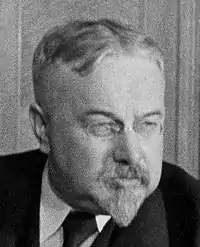Stanisław Stroński
Stanisław Stroński (1882 – 1955) was a Polish philologist, publicist and politician (a National Democracy Sejm deputy). In interwar Poland he edited the Rzeczpospolita newspaper and was a professor at Kraków's Jagiellonian University and at the Catholic University of Lublin. During World War II he was a member of the Polish government in exile, serving as information minister.[1] At war's end, he remained abroad.

An outspoken antisemite, Stroński had recent and well documented Jewish roots (his mother Emilia Loevy was a daughter of a Jewish physician from Nisko). Jewish members of the Sejm frequently mentioned his Jewish ancestry when attacking him in speeches.[2]
He was a vocal prewar opponent of Poland's first president, Gabriel Narutowicz, and of Marshal Józef Piłsudski. Following Narutowicz's election, Stroński wrote that he "puts himself forward as a representative of the Polish state thanks to the Jewish-German-Ukrainian vote".[3] Following Narutowicz's murder, Stroński who had just a few days earlier called him a "their [the Jews] President", wrote that the murdered president belonged to the "whole nation".[4]
It was Stroński who coined the expression, "Miracle at the Vistula," intended to derogate Piłsudski's 1920 victory over the Soviets.[5] Ironically, the expression quickly lost its intended meaning and was adopted with approval by some patriotically- or piously-minded Poles unaware of Stroński's ironic intent.[6]
His academic interests centered on the medieval Occitan literature, especially about the Troubadours. In this field he is reputed as one of the most important scholars of the 20th century.[7]
References
- Engel, David. "The frustrated alliance: The revisionist movement and the Polish government‐in‐exile, 1939–1945." Studies in Zionism 7.1 (1986): 11-36.
- Primed for Violence: Murder, Antisemitism, and Democratic Politics in Interwar Poland, University of Wisconsin Press, Paul Brykczynski, page 150
- In Search of Lost Meaning: The New Eastern Europe, University of California press, Adam Michnik, page 77
- Primed for Violence: Murder, Antisemitism, and Democratic Politics in Interwar Poland, University of Wisconsin Press, Paul Brykczynski, page 107
- Frątczak, Sławomir Z. (2005). "Cud nad Wisłą". Głos (in Polish) (32/2005). Archived from the original on May 10, 2017. Retrieved September 3, 2017.
- (in Polish) Janusz Szczepański, Kontrowersje wokół Bitwy Warszawskiej 1920 roku Archived May 14, 2008, at the Wayback Machine (Controversies surrounding the Battle of Warsaw in 1920). Mówią Wieki, online version.
- S. Stroński, Le Troubadour Elias de Barjols, Toulouse, Privat, 1906; S. Stroński, Le Troubadour Folquet de Marseille, Cracovie, Académie des Sciences-Éditions du Fonds Osławski 1910; S. Stroński, La Légende amoureuse de Bertran de Born, Paris, Champion, 1914.